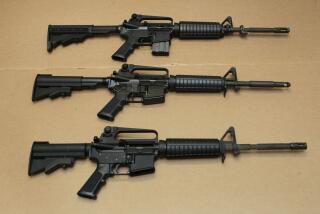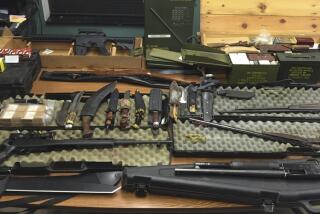Stemming Flow of Arms to Caribbean
- Share via
MIAMI — The business card for the 27th Ave. Pawn & Gun shop near the Miami River advertises: “Buy. Sell. Trade. Anything of value.” But the sign outside the gritty strip mall that caters to small Caribbean freighter crews docking just two blocks away is more specific: “Guns & Ammo.”
And for months, U.S. federal agents allege, owner Roman Hernz, 52, was a leading source of cheap, California-made handguns that illegally found their way to Haiti, the Dominican Republic, Honduras, Colombia and Puerto Rico--some getting into the hands of criminals.
On Thursday, agents with the Bureau of Alcohol, Tobacco and Firearms raided the shop, confiscated pistols, seized documents and arrested Hernz--climaxing a three-month undercover investigation that ATF officials say has cast a spotlight on a booming trade in illegal U.S. arms to the Caribbean. Hernz was formally charged Friday before being released on his own recognizance.
In the last several months alone, Jamaican customs inspectors have seized dozens of guns, rifles and even machine guns, hidden in food barrels, tires and other shipments from Florida and New Jersey. Haitian police have found smuggled pistols inside frozen turkeys. And in the Bahamas, police working with ATF agents in Florida have traced several weapons used in recent violent crimes there to U.S. gun dealers.
Many in the region blame the arms trade, in part, for spiraling violent crime in their nations, which depend on tourism for economic survival. Led by Jamaica and the Bahamas, they have appealed to the Clinton administration to stem the tide of guns at the source.
“What bothers me most right now is the influx of guns from the United States,” said Jamaican National Security Minister K.D. Knight.
In response, the ATF has intensified its anti-smuggling operations--especially in Miami. The serial numbers of hundreds of weapons confiscated throughout the Caribbean are being traced through the agency’s computer in West Virginia, and then by street agents at gun shops from Miami to California.
Other ATF agents have gone to the Caribbean region to establish closer ties and teach local police gun-tracing techniques. But the results have been mixed.
Bill Newell, who heads the Miami ATF office’s arms-trafficking unit, praised Colombia and Jamaica, which now routinely send the ATF the serial numbers of confiscated U.S. weapons. The agency then traces the weapon from its first sale to its last, often ending in a gun dealer’s arrest.
But Newell singled out for criticism the Haitian National Police, a force recruited and trained under a multimillion-dollar State Department program to rebuild it after the U.S.-led military intervention there in 1994.
Law enforcement sources in Haiti recently have conceded that police corruption endures in the impoverished nation, fueling its escalating drug and arms trades. On Thursday, Newell appealed for more police cooperation from Haiti.
“If we could get a lot more cooperation from Caribbean countries like Haiti, we could help them solve a lot of their crime problems,” he said.
Those problems are likely only to worsen as the United Nations prepares to end its six-year mission to restore Haitian democracy.
“Right now, we’re seeing a really large number of guns being purchased by Haitians,” Newell said. “A number of Haitians we’ve arrested have told us the only way they can protect themselves after the U.N. pulls out is to arm themselves.”
In the case of the Miami pawnshop, said Newell and ATF spokesman Eduardo Halley, the investigation began when the agency traced several guns used in crimes throughout the Caribbean region to the shop.
Undercover agents and informants with criminal backgrounds then made a series of illegal gun buys from Hernz, who, according to an ATF affidavit filed in the case, falsified records to make the sales appear legal.
Hernz’s access to the Caribbean market, Halley said, rested on his shop’s location--a short walk from the river docks where U.S. Customs and Drug Enforcement Administration agents routinely seize small freighters and arrest suspected illegal immigrants and cocaine dealers arriving from throughout the Caribbean.
“The ship captains are looking to profit from the return journey,” Halley said. “They buy a cheap 9-millimeter Lorcin pistol here for $70 and sell it in Haiti for $250 or $300. It’s all about money and location.”
More to Read
Sign up for Essential California
The most important California stories and recommendations in your inbox every morning.
You may occasionally receive promotional content from the Los Angeles Times.













